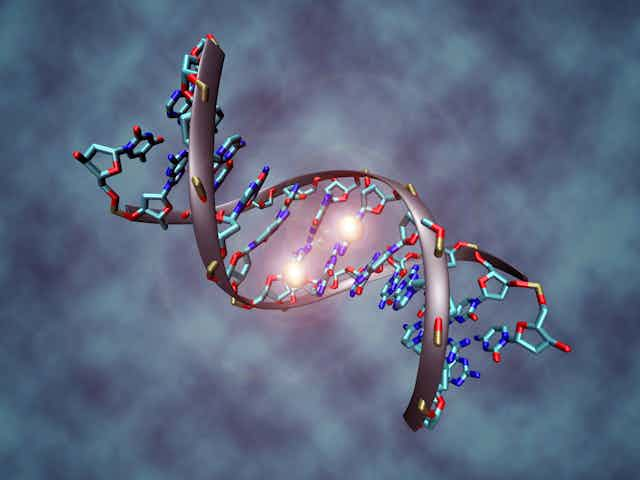Epigenetics, the study of how environmental factors and lifestyle choices influence our genes, has flourished to become one of the most groundbreaking areas of science over the past decade. Studies have shown that, among other things, toxins, stress, socio-economic status, bullying, racism and the lifestyles of our parents and grandparents can all turn on or off certain genes in our DNA. The field is radically changing how we think about nature and nurture – giving it an impact far beyond the lab.
But what are the wider implications now we no longer seem to be just a product of our genes? If it is possible to improve the functioning of everyone’s genes with the right environment, it may seem that a better understanding of epigenetics will lead to a more liberal and egalitarian society. But in my recent book, Political Biology, I note some worrying signs that the opposite could also be true.
Despite big research efforts, there are still uncertainties about the exact nature of epigenetic effects. This is especially true when it involves claims that changes to genes persist for generations. For that reason, epigenetics remains a controversial science, although progress is being made rapidly.

However, despite these uncertainties, the wider implications are often taken for granted. Epigenetics is generally considered to be a basis for a better, more progressive, liberal and inclusive social policy. If the environment is much more important than we thought in shaping our fate, there seems to be much more space to attack inequality at its root. In fact, this has been a popular argument, used by people including Nobel Laureate James Heckman.
A eugenic legacy?
But is that the whole truth? To understand the darker implications of epigenetics, just think back through human history. There certainly is no shortage of war, famine, exploitation, destruction, epidemic and trauma. Knowing that some of this can leave a biological trace in our genes – which can even be transmitted to future generations – could be problematic.
Even in the 1920s, some believed that the environment could influence inheritance. Some focused on the fact that we could inherit the best of our civilisation and become better humans, while others argued that certain populations had been exposed to various pathogenic environments (alcoholism, poverty, promiscuity, hot climate) for too log, becoming irreparably damaged. Their offspring, too, had to be treated with special care, as it was believed that the damage was likely transmitted across generations.
The latter idea in particular played into the hands of supporters of eugenics, a popular theory in the early 20th century. It was based on the belief that the quality of the human population could be improved if people with traits seen as undesirable could be stopped from reproducing. Some countries therefore launched eugenics programmes prohibiting certain marriages and supporting forced sterilisations. Those seen as unfit to pass on their genes typically included people with mental or physical disabilities. However, such measures became increasingly out of fashion after World War II (though persisted until 1970s in many Western countries), as it became associated with Nazi Germany (in truth Nazis learned a good deal from American eugenics).

Around 1910, English physician, writer and maverick supporter of eugenics, Caleb Saleeby, for example, spoke about “racial poison” to describe the destructive effects toxins such as alcohol could have on entire populations (“race”). The implication was that some races, or social groups, had an acquired inferiority to others.
But then genetics became the new norm – and the idea of a heredity that could be poisoned by environmental factors pretty much disappeared from Western policy debates. For a while, it was believed that genes make us who we are, not what happens to us or our ancestors.
Then epigenetics – which came to the fore around the year 2000 – changed everything again. In 2013, The Economist titled a story about an epigenetic study on folate deficiency “Poisoned inheritance”. While the magazine was likely unaware of the past use of the term, it was a telling moment for us sociologists.
Meanwhile, in 2009, a well cited study in the American Journal of Human Biology linked the relatively low birth weight of African-Americans, compared with European-Americans, to the long-term effects of 19th century slavery. The study noted that low birth weight leads to higher mortality in infancy and long-term negative health consequences. It highlighted epigenetic mechanisms as a potential factor influencing such long-term effects. Such a speculative claim is obviously open to a large number of different interpretations. It can support arguments for a better and stronger investment in the healthcare system – but, far more worringly, it can also be used by racist groups trying to argue for the “acquired inferiority” of specific populations.
Similarly, a study on social inequalities in Glasgow found that the poorest people, as well as the manual workers, were born with low levels of an epigenetic marker called DNA methylation (a biochemical process that controls how genes work). Lower methylation has been related to the risk of developing diabetes and cardiovascular disease, and linked to the stressful conditions experienced by expectant mothers in poor areas.
The Irish Times spoke of “cards of life … dealt just weeks after conception, when methylation takes place in the embryo”. Similarly, The Scotsman declared: “Babies born into poverty are damaged forever before birth.” It is clear that these findings could be used not only to call for regeneration and support, but also to talk about degeneration and “poisoning”.
Today, we generally are educated about the dangers of eugenics. But it is important to keep talking about these issues, before minority groups such as racists try to hijack epigenetics to further their cause. In focusing on the environment as a cause for many unwanted conditions, epigenetics has the potential to advance social justice. But we need to remember that it is no guarantee of a more inclusive society. Social values often decide how we implement science, rather than the other way round.

